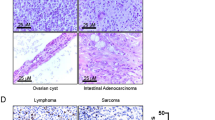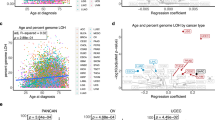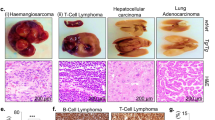Abstract
Aging is thought to negatively affect multiple cellular processes including the ability to maintain chromosome stability. Chromosome instability (CIN) is a common property of cancer cells and may be a contributing factor to cellular transformation. The types of DNA aberrations that arise during aging before tumor development and that contribute to tumorigenesis are currently unclear. Mdm2, a key regulator of the p53 tumor suppressor and modulator of DNA break repair, is frequently overexpressed in malignancies and contributes to CIN. To determine the relationship between aging and CIN and the role of Mdm2, precancerous wild-type C57Bl/6 and littermate-matched Mdm2 transgenic mice at various ages were evaluated. Metaphase analyses of wild-type cells showed a direct correlation between age and increased chromosome and chromatid breaks, chromosome fusions and aneuploidy, but the frequency of polyploidy remained stable over time. Elevated levels of Mdm2 in precancerous mice increased both the numerical and the structural chromosomal abnormalities observed. Chromosome and chromatid breaks, chromosome fusions, aneuploidy and polyploidy were increased in older Mdm2 transgenic mice compared with wild-type littermates. Unexpectedly, chromosome fusions, aneuploidy and polyploidy rates in Mdm2 transgenic mice, but not chromosome and chromatid breaks, showed cooperation between Mdm2 overexpression and age. Notably, Mdm2 overexpression promoted gains in one or more chromosomes with age, while it did not affect the rate of chromosome loss. Therefore, aging increased specific forms of genomic instability, and elevated Mdm2 expression cooperated with aging to increase the likelihood of gaining certain chromosomal abnormalities of the kind thought to lead to cancer development.
This is a preview of subscription content, access via your institution
Access options
Subscribe to this journal
Receive 50 print issues and online access
$259.00 per year
only $5.18 per issue
Buy this article
- Purchase on Springer Link
- Instant access to full article PDF
Prices may be subject to local taxes which are calculated during checkout






Similar content being viewed by others
References
Agresti A . (2002). Categorical Data Analysis. 2nd edn. John Wiley & Sons: Hoboken NJ.
Alt JR, Bouska A, Fernandez MR, Cerny RL, Xiao H, Eischen CM . (2005). Mdm2 binds to Nbs1 at sites of DNA damage and regulates double strand break repair. J Biol Chem 280: 18771–18781.
Aubert G, Lansdorp PM . (2008). Telomeres and aging. Physiol Rev 88: 557–579.
Bouska A, Eischen CM . (2009). Mdm2 affects genome stability independent of p53. Cancer Res 69: 1697–1701.
Bouska A, Lushnikova T, Plaza S, Eischen CM . (2008). Mdm2 promotes genetic instability and transformation independent of p53. Mol Cell Biol 28: 4862–4874.
Carroll PE, Okuda M, Horn HF, Biddinger P, Stambrook PJ, Gleich LL et al. (1999). Centrosome hyperamplification in human cancer: chromosome instability induced by p53 mutation and/or Mdm2 overexpression. Oncogene 18: 1935–1944.
Demuth I, Digweed M . (2007). The clinical manifestation of a defective response to DNA double-strand breaks as exemplified by Nijmegen breakage syndrome. Oncogene 26: 7792–7798.
DePinho RA, Polyak K . (2004). Cancer chromosomes in crisis. Nat Genet 36: 932–934.
Difilippantonio S, Celeste A, Fernandez-Capetillo O, Chen HT, Reina San Martin B, Van Laethem F et al. (2005). Role of Nbs1 in the activation of the Atm kinase revealed in humanized mouse models. Nat Cell Biol 7: 675–685.
Diggle P, Heagerty P, Liang K-Y, Zeger S . (2002). Analysis of Longitudinal Data. 2nd edn. Oxford University Press: Oxford.
Dolle ME, Vijg J . (2002). Genome dynamics in aging mice. Genome Res 12: 1732–1738.
Feng Z, Hu W, Teresky AK, Hernando E, Cordon-Cardo C, Levine AJ . (2007). Declining p53 function in the aging process: a possible mechanism for the increased tumor incidence in older populations. Proc Natl Acad Sci USA 104: 16633–16638.
Fujiwara T, Bandi M, Nitta M, Ivanova EV, Bronson RT, Pellman D . (2005). Cytokinesis failure generating tetraploids promotes tumorigenesis in p53-null cells. Nature 437: 1043–1047.
Ganem NJ, Storchova Z, Pellman D . (2007). Tetraploidy, aneuploidy and cancer. Curr Opin Genet Dev 17: 157–162.
Garagna S, Marziliano N, Zuccotti M, Searle JB, Capanna E, Redi CA . (2001). Pericentromeric organization at the fusion point of mouse Robertsonian translocation chromosomes. Proc Natl Acad Sci USA 98: 171–175.
Garinis GA, van der Horst GT, Vijg J, Hoeijmakers JH . (2008). DNA damage and ageing: new-age ideas for an age-old problem. Nat Cell Biol 10: 1241–1247.
Gorbunova V, Seluanov A, Mao Z, Hine C . (2007). Changes in DNA repair during aging. Nucleic Acids Res 35: 7466–7474.
Jin Y, Lee H, Zeng SX, Dai MS, Lu H . (2003). MDM2 promotes p21waf1/cip1 proteasomal turnover independently of ubiquitylation. EMBO J 22: 6365–6377.
Jones SN, Hancock AR, Vogel H, Donehower LA, Bradley A . (1998). Overexpression of Mdm2 in mice reveals a p53-independent role for Mdm2 in tumorigenesis. Proc Natl Acad Sci USA 95: 15608–15612.
Lengauer C, Kinzler KW, Vogelstein B . (1998). Genetic instabilities in human cancers. Nature 396: 643–649.
Levine AJ, Oren M . (2009). The first 30 years of p53: growing ever more complex. Nat Rev Cancer 9: 749–758.
Lin H, de Carvalho P, Kho D, Tai CY, Pierre P, Fink GR et al. (2001). Polyploids require Bik1 for kinetochore-microtubule attachment. J Cell Biol 155: 1173–1184.
Lundgren K, Montes de Oca Luna R, McNeill YB, Emerick EP, Spencer B, Barfield CR et al. (1997). Targeted expression of MDM2 uncouples S phase from mitosis and inhibits mammary gland development independent of p53. Genes Dev 11: 714–725.
Marine JC, Lozano G . (2010). Mdm2-mediated ubiquitylation: p53 and beyond. Cell Death Differ 17: 93–102.
Morgan WF, Corcoran J, Hartmann A, Kaplan MI, Limoli CL, Ponnaiya B . (1998). DNA double-strand breaks, chromosomal rearrangements, and genomic instability. Mutat Res 404: 125–128.
Negrini S, Gorgoulis VG, Halazonetis TD . (2010). Genomic instability--an evolving hallmark of cancer. Nat Rev Mol Cell Biol 11: 220–228.
Nisitani S, Hosokawa M, Sasaki MS, Yasuoka K, Naiki H, Matsushita T et al. (1990). Acceleration of chromosome aberrations in senescence-accelerated strains of mice. Mutat Res 237: 221–228.
Rayburn E, Zhang R, He J, Wang H . (2005). MDM2 and human malignancies: expression, clinical pathology, prognostic markers, and implications for chemotherapy. Curr Cancer Drug Targets 5: 27–41.
Stewart ZA, Leach SD, Pietenpol JA . (1999). p21(Waf1/Cip1) inhibition of cyclin E/Cdk2 activity prevents endoreduplication after mitotic spindle disruption. Mol Cell Biol 19: 205–215.
Storchova Z, Kuffer C . (2008). The consequences of tetraploidy and aneuploidy. J Cell Sci 121: 3859–3866.
Thompson SL, Bakhoum SF, Compton DA . (2010). Mechanisms of chromosomal instability. Curr Biol 20: R285–R295.
Thompson SL, Compton DA . (2010). Proliferation of aneuploid human cells is limited by a p53-dependent mechanism. J Cell Biol 188: 369–381.
Tucker JD, Spruill MD, Ramsey MJ, Director AD, Nath J . (1999). Frequency of spontaneous chromosome aberrations in mice: effects of age. Mutat Res 425: 135–141.
Vitale I, Senovilla L, Jemaa M, Michaud M, Galluzzi L, Kepp O et al. (2010). Multipolar mitosis of tetraploid cells: inhibition by p53 and dependency on Mos. EMBO J 29: 1272–1284.
Wang P, Lushnikova T, Odvody J, Greiner TC, Jones SN, Eischen CM . (2008). Elevated Mdm2 expression induces chromosomal instability and confers a survival and growth advantage to B cells. Oncogene 27: 1590–1598.
Williams BR, Mirzoeva OK, Morgan WF, Lin J, Dunnick W, Petrini JH . (2002). A murine model of Nijmegen breakage syndrome. Curr Biol 12: 648–653.
Wu X, Avni D, Chiba T, Yan F, Zhao Q, Lin Y et al. (2004). SV40T antigen interacts with Nbs1 to disrupt DNA replication control. Genes Dev 18: 1305–1316.
Zietkiewicz E, Wojda A, Witt M . (2009). Cytogenetic perspective of ageing and longevity in men and women. J Appl Genet 50: 261–273.
Acknowledgements
We thank the members of the Eischen lab for thoughtful discussions. This work was supported by the NIH/NCI grants: R01 CA117935 (CME) and the Vanderbilt Cancer Center grant P30 CA068485.
Author information
Authors and Affiliations
Corresponding author
Ethics declarations
Competing interests
The authors declare no conflict of interest.
Rights and permissions
About this article
Cite this article
Lushnikova, T., Bouska, A., Odvody, J. et al. Aging mice have increased chromosome instability that is exacerbated by elevated Mdm2 expression. Oncogene 30, 4622–4631 (2011). https://doi.org/10.1038/onc.2011.172
Received:
Revised:
Accepted:
Published:
Issue Date:
DOI: https://doi.org/10.1038/onc.2011.172



